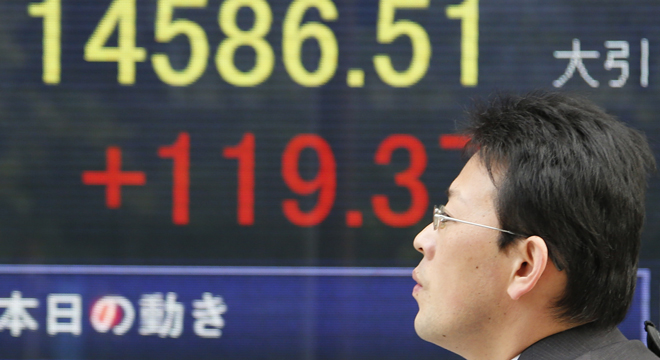BEIJING (AP) — The International Monetary Fund appealed Thursday to Washington for more stable management of the nation’s finances as Asian stock markets rose after U.S. leaders agreed to avoid a debt default and end a 16-day government shutdown.
With only hours to spare until the $16.7 trillion debt limit was reached, Congress passed and sent a waiting President Barack Obama legislation Wednesday night to allow more government borrowing and reopen public agencies.
The debt standoff had rattled global markets and threatened the image of U.S. Treasury debt as a risk-free place for governments and investors to store trillions of dollars in reserves. Few expected a U.S. default but some investors sold Treasurys over concern about possible delayed repayment and put off buying stocks that might be exposed to an American economic downturn.
“World heaves sigh of relief as U.S. barely averts debt default,” said the Times of India newspaper in a headline.
IMF managing director Christine Lagarde welcomed the deal but said the shaky American economy needs more stable long-term finances. The deal only permits the Treasury to borrow normally through Feb. 7 and fund the government through Jan. 15.
“It will be essential to reduce uncertainty surrounding the conduct of fiscal policy by raising the debt limit in a more durable manner,” Lagarde said in a statement.
The Tokyo stock market, the region’s heavyweight, gained as much as 1.1 percent Thursday. Markets in South Korea, Australia and Southeast Asia also gained.
Still, the congressional cliffhanger might dent longer-term confidence in American government debt, a cornerstone of global credit markets, prompting creditors to demand higher interest.
“With the U.S. government’s antics, the risks go up, so the cost of money could go up too,” said Nick Chen, managing partner of Taipei law firm Pamir Law Group.
Big Asian exporters including China and South Korea also faced the risk of a slump in global demand if a U.S. default had disrupted other economies.
China’s government, Washington’s biggest foreign creditor with $1.3 trillion invested in Treasurys, welcomed the end to the standoff.
“This issue concerns many countries in the world,” said a foreign ministry spokeswoman, Hua Chunyin, speaking at a regular briefing. “The United States is the biggest economy in the world. For them to handle the issue properly is to their own interest and beneficial to their own development. We welcome their decision.”
In South Korea’s capital Seoul, 26-year old college senior Lee Boo-gun said he thought the U.S. economy was going belly up and was relieved to hear that a deal was reached.
“I thought it would affect Korea’s economy. The U.S. would hit Europe and then it would affect Asia,” he said.
Martin Hennecke, chief economist at The Henley Group, a financial advisory firm in Hong Kong, expressed exasperation at what he said was a failure by U.S. politicians to fix underlying budget problems in the world’s biggest economy.
“It’s just show business, to distract from real issues and keep the public busy with nonsense,” said Hennecke. “What they should negotiate is how to make a bankruptcy negotiation of the United States, because they are broke. That’s the issue. It’s not about some stupid debt ceiling.”
China and Japan, which each own more than $1 trillion of Treasury securities, appealed earlier to Washington for a quick settlement. There was no indication whether either government had altered its debt holdings. South Korea’s government has $51.4 billion of Treasury securities while Taiwan has $185 billion.
Earlier, China’s official Xinhua News Agency had accused Washington of jeopardizing other countries’ dollar-denominated assets.
It called for “building a de-Americanized world,” though analysts say global financial markets have few alternatives to the dollar for trading and U.S. government debt for holding reserves.
In Israel, a key American ally in the Middle East, commentators said the fight hurt America’s overall image.
“There is no doubt that damage was done here to the image of American economic stability,” Israel’s economic envoy to Washington, Eli Groner, told Israel’s Army Radio. “It’s not good for the financial markets, not in the United States and not around the world.”
China and other central banks might want to move assets into other currencies, said Hennecke. However, he said their dollar-based holdings are so huge they cannot sell without driving down prices.
Hennecke said he would advise clients to stop holding Treasurys.
“Why hold it?” he said. “There’s no yield and inflation and interest rate risk are on the up.”
___
AP Business Writers Kelvin Chan in Hong Kong and Youkyung Lee in Seoul and AP Writers Peter Enav in Taipei, Tim Sullivan in New Delhi and Tia Goldenberg in Jerusalem contributed.
Copyright 2013 The Associated Press. All rights reserved. This material may not be published, broadcast, rewritten or redistributed.






